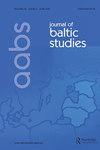迫害的鲜活记忆:拉脱维亚罗姆人的口述历史和公共纪念问题
IF 0.5
4区 社会学
Q2 AREA STUDIES
引用次数: 0
摘要
本文着眼于拉脱维亚罗姆人的生活故事和模糊的过去,重点关注第二次世界大战期间迫害的叙述。这些叙述虽然保存在家庭圈子和交际记忆中,但由于纪念种族灭绝受害者的活动在拉脱维亚没有得到很好的发展,因此缺乏更广泛的关注。这项研究试图了解是什么阻止记忆进入公共领域。为此,作者转向了罗姆记忆文化和其他可能影响种族灭绝集体记忆永久化的社会因素。本文章由计算机程序翻译,如有差异,请以英文原文为准。
The living memory of persecutions: oral histories of the Roma in Latvia and the question of public commemoration
ABSTRACT This article looks at the life stories and the obscured past of the Latvian Roma with a focus on narratives of persecution during World War II. These narratives, while preserved in family circles and communicative memory, lack wider attention as the commemoration of victims of genocide is not well developed in Latvia. This research attempts to understand what prevents memories from entering the public sphere. For that, the author turns to Romani memory culture and other social factors that can influence the perpetuation of the collective memory of genocide.
求助全文
通过发布文献求助,成功后即可免费获取论文全文。
去求助
来源期刊

Journal of Baltic Studies
AREA STUDIES-
CiteScore
1.20
自引率
0.00%
发文量
52
期刊介绍:
The Journal of Baltic Studies, the official journal of the Association for the Advancement of Baltic Studies (AABS), is a peer-reviewed, multidisciplinary journal for the purpose of advancing the accumulation of knowledge about all aspects of the Baltic Sea region"s political, social, economic, and cultural life, past and present. Preference is given to original contributions that are of general scholarly interest. The Association for the Advancement of Baltic Studies is an international, educational, and scholarly non-profit organization. Established in 1968, the purpose of the Association is the promotion of research and education in Baltic Studies.
 求助内容:
求助内容: 应助结果提醒方式:
应助结果提醒方式:


